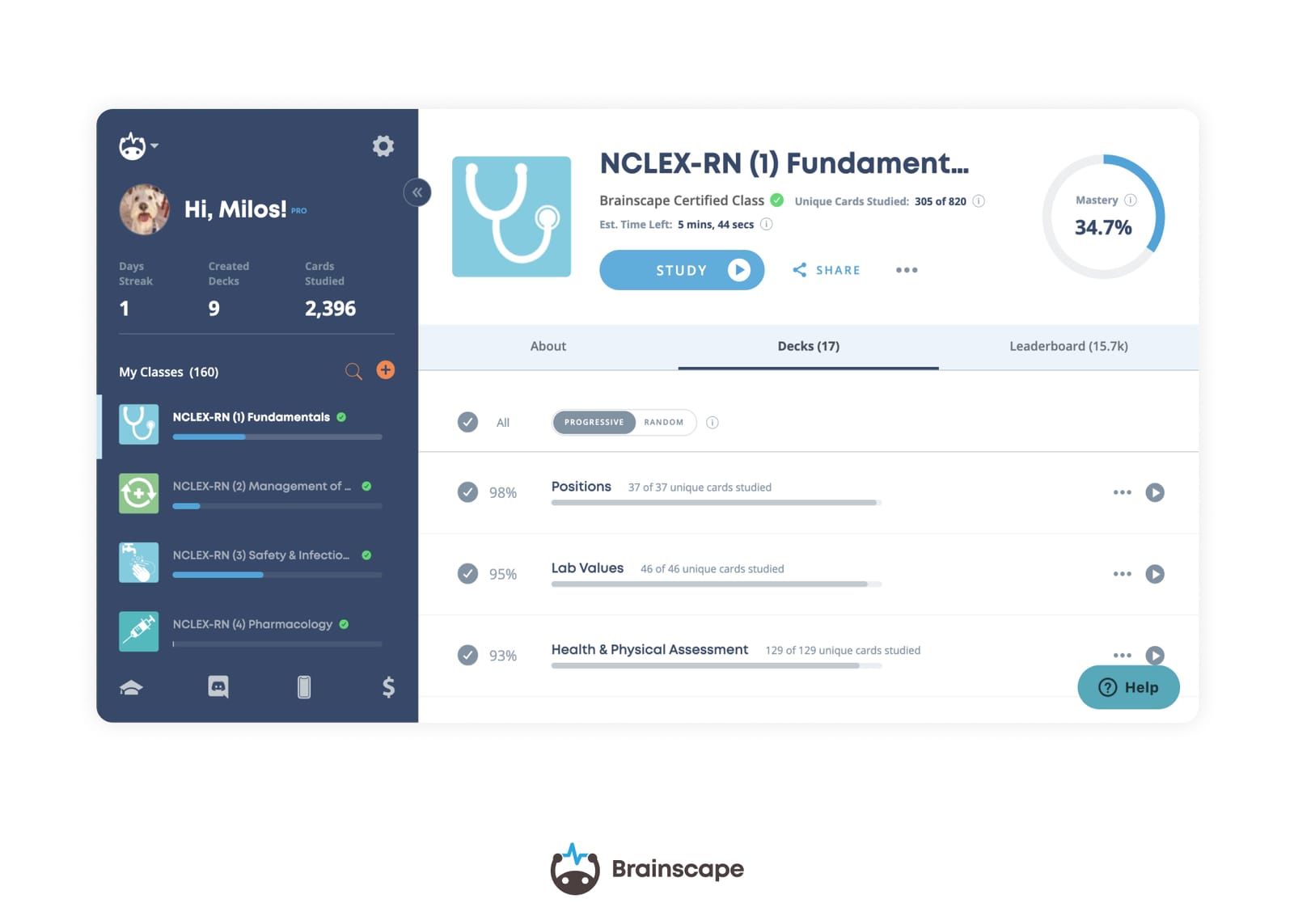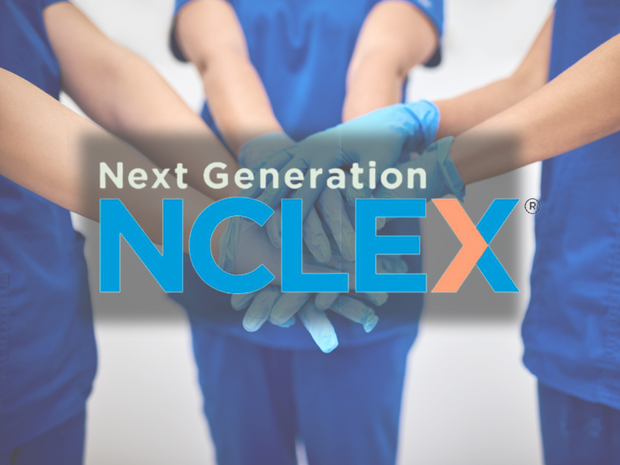In April 2023, the NCSBN released a revamped NCLEX to the world, the Next Generation NCLEX (NGN), compelling nursing students/grads just like you to rethink your studying strategies!
So, to help you adapt and prepare, the team here at Brainscape joined forces with NCLEX prep expert Justine Buick (www.theNCLEXTutor.com), who has crafted from scratch a collection of Next Gen NCLEX practice questions, which you'll see shortly.
But first, a brief aside on the difference between standalone and case study questions...
Standalone Vs. Case Study NGN Questions
The NCLEX poses questions either as “stand-alone” questions or as “case studies”. In the case of the former, they are (as their name suggests) one-off, discrete questions. Once you finish answering them, you move on to the next question, which isn’t at all related.
Case studies, on the other hand, ask a series of questions based on the same patient/case, so it serves you to bear in mind your previous answers and maintain a degree of cohesiveness as you work through them. It's important to identify relevant details and learn how to prioritize actions, just like you would with a real patient.
The first Next Generation NCLEX practice question we’ll be tackling, however, is a standalone bowtie. This is one of the more common types of standalone questions on the NCLEX, which very simply gives you a patient scenario, followed by one question for you to answer.
Let’s go!
NGN Practice Question: Standalone Bowtie
The nurse is caring for a 67-year-old client in the cardiac care unit. The nurse documents the following data in the Nurses’ Notes.
Nurses' Notes
1530: Client was admitted 2 days ago for a scheduled coronary artery bypass graft (CABG) x 2 vessels. No complications during surgery, and recovered in the ICU overnight. Client transferred out of the ICU this morning to the cardiac care unit.
History of coronary artery disease, hypertension, hyperlipidemia, and osteoporosis. Assessment findings are as follows: alert and oriented x 3; denies shortness of breath, sore throat or cough, lungs clear bilaterally; irregular heart rhythm auscultated, denies chest pain, skin is warm to touch, cap refill < 3 seconds, no edema and peripheral pulses 2+ and equal bilaterally; denies nausea/vomiting, bowel sounds active x 4 quadrants, reports passing flatus and last bowel movement was the morning of surgery; indwelling foley catheter was discontinued this morning and has been voiding clear, yellow urine without complications; up to bathroom 2 times with assistance; gait steady.
Client is currently sitting at the bedside and reporting a "racing heartbeat" and "feeling faint". Vital signs are HR 142 beats/min, BP 116/78, RR 18 breaths/min, pulse oximetry 96% on room air, and temperature 98.4 F (36.9 C).
Complete the diagram by selecting from the choices below to specify which potential condition the client is most likely experiencing, 2 actions the nurse takes to address that condition, and 2 parameters the nurse monitors to assess the client's progress.
For The Answers...
Download Brainscape's certified NCLEX flashcards, and we'll send the detailed answer and rationale to your inbox! These flashcards are FREE to sign up for, and you can study a certain number of them before hitting any paywalls.
NGN Practice Question: Case Study
Now, let's try another type of NGN question: the case study, which, if you remember what we previously explained, poses a series of questions based on the same patient/case. So remember to bear in mind your previous answers and maintain a degree of cohesiveness as you work through them!
The nurse is caring for an older adult in the intermediate care unit.
Nurses' Notes
1000: Client admitted with an exacerbation of chronic obstructive pulmonary disease (COPD). Client has used home oxygen at 3 L/minute by nasal cannula for 4 years but reports increased dyspnea over the last several days. Client increased portable oxygen to 5 L/minute.
Currently, the client is fatigued but alert and oriented x 3. Client reports shortness of breath at rest, increased coughing and large amounts of thick, tan sputum. Client has labored breathing and is in the tripod position.
Lung sounds with wheezes bilaterally. S1 and S2 heart sounds heard, no murmur or gallop noted. Vital signs obtained. Healthcare provider in to see client and admission laboratory tests completed. Respiratory therapist was in to obtain ABGs.
Vital Signs
Lab Results
The nurse assesses the client, obtains the vital signs, and reviews the laboratory results. 1. Which laboratory findings require follow-up? Select all that apply.
2. The nurse reviews the assessment findings and laboratory results. For each client finding, click to select the finding that is most consistent with the condition of hypercapnia or hypoxemia. Each finding may support more than one condition.
3. Complete the following sentence by choosing from the list of options.The client is at highest risk for developing [Option 1] as evidenced by the client's [Option 2].
4. For each finding below, choose the potential nursing intervention that is appropriate for the nurse to include in the plan of care. Each finding may support more than one intervention.
The nurse reviews the healthcare provider's orders.
Orders
- Continuous pulse oximetry monitoring
- Oxygen via venturi face mask, titrate to maintain pulse ox >88% • collect sputum culture for culture and sensitivity
- Repeat ABGs at 1800 today
- X-ray of chest today
- Medications
- albuterol 2.5 mg via inhaler three times a day
- fluticasone 88 mcg via inhaler three a day guaifenesin 400 mg PO every 4 hours
5. What teaching points does the nurse provide regarding the inhaled medications? Select 3 teaching points.
The nurse assesses the client after implementing the healthcare provider's orders.
6. Check whether the assessment findings indicate that the client’s condition is either Improved/Stable or Not Improved.
NGN Case Study Answers

Download Brainscape's certified NCLEX flashcards, and we'll send the detailed answer and rationale to your inbox! These flashcards are FREE to sign up for, and you can start studying before hitting any paywalls.
Additional Reading
- The #1 Habit to Succeed in Medical and Nursing School
- How to Find & Use NCLEX Practice Questions
- How to use Brainscape in nursing school
References
NCSBN launches Next Generation Nclex Exam. NCSBN. (n.d.). https://www.ncsbn.org/news/ncsbn-launches-next-generation-nclex-exam
The Nclex tutor. The NCLEX Tutor. (2025, March 20). https://thenclextutor.com/
Top NCLEX practice questions you should study. Nurse.org. (n.d.-b). https://nurse.org/education/nclex-practice-questions/
